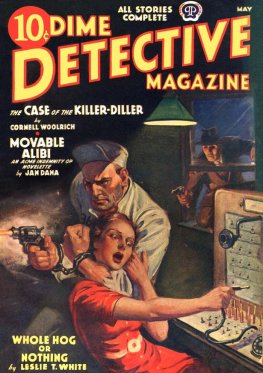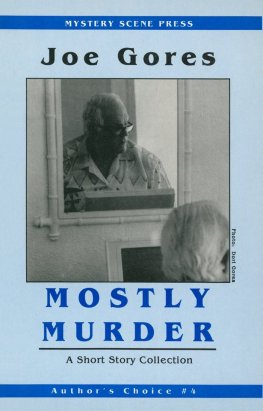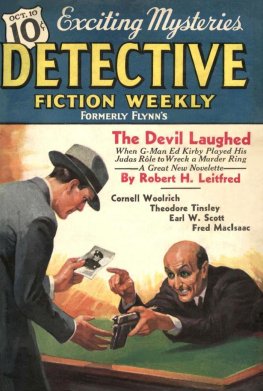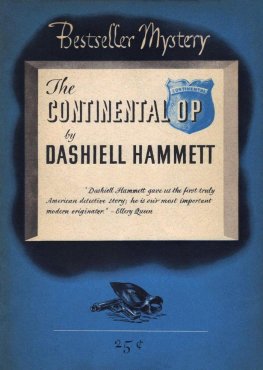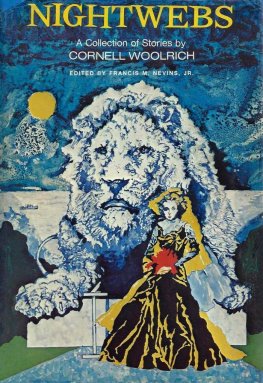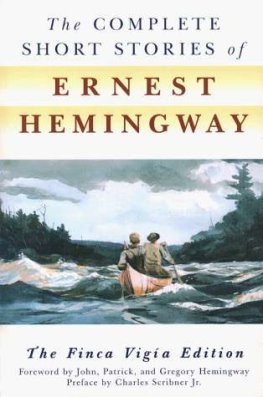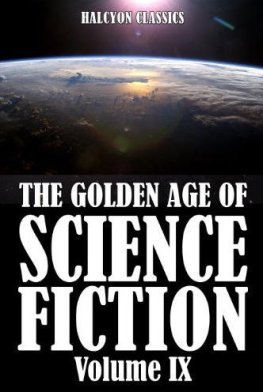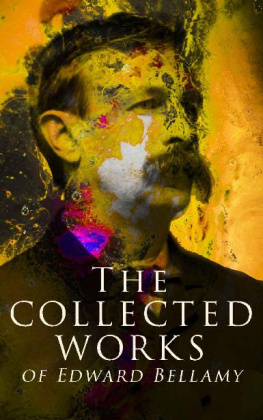Cornell Woolrich
A Treasury of Stories
I was only trying to cheat death. I was only trying to surmount for a little while the darkness that all my life I surely knew was going to come rolling in on me some day and obliterate me.
I was only trying to stay alive a little brief while longer, after I was already gone. To stay in the light, to be with the living a little while past my time.
Cornell Woolrich
Cornell George Hopley-Woolrich was born in New York City on December 4, 1903, but lived his early years in Mexico until his parents separated; and eventually divorced. Shortly thereafter, Woolrich and his mother, Claire Attalie Woolrich, moved back to America.
He attended Columbia University but left in 1926 without graduating when his first novel, Cover Charge, was published. Cover Charge was one of six Jazz Age novels inspired by the work of F. Scott Fitzgerald.
Woolrich is best known for penning the short story, It had to Be Murder [which is loosely-based on H. G. Wells short story Through a Window], that Alfred Hitchcock based the film, Rear Window on. In 1990, ownership of the copyright in Woolrichs original story It Had to Be Murder and its use for Rear Window was litigated before the United States Supreme Court in Stewart v. Abend, 495 U.S. 207.
He went on to be the father of American noir fiction, with his numerous short stories published in the pulp fiction magazines of the 1930s, 40s and 50s; as well as his legendary black series of novels, many of which have been turned into major motion pictures.
Getting a Hollywood contract in the late 1920s he worked as screenwriter. Woolrich was homosexual and was very sexually active in his youth. In 1930, while working as a screenwriter in Los Angeles, Woolrich married Violet Virginia Blackton (191065), daughter of silent film producer J. Stuart Blackton. They separated after three months, and the marriage was annulled in 1933.
Woolrich returned to New York where he and his mother moved into the Hotel Marseilles (Broadway and West 103rd Street). He lived there until her death on October 6, 1957, which prompted his move to the Hotel Franconia (20 West 72nd Street).
He soon turned to pulp and detective fiction, often published under his pseudonyms: William Irish and George Hopley.
In later years, he socialized on occasion in Manhattan bars with Mystery Writers of America colleagues and younger fans such as writer Ron Goulart, but alcoholism and an amputated leg (caused by an infection from a too-tight shoe which went untreated) left him a recluse.
Franois Truffaut filmed Woolrichs The Bride Wore Black and Waltz Into Darkness in 1968 and 1969, respectively, the latter as Mississippi Mermaid. He did not attend the premiere of Truffauts film of his novel The Bride Wore Black in 1968, even though it was held in New York City. He died weighing 89 pounds. He is interred in the Ferncliff Cemetery in Hartsdale, New York.
His biographer, Francis Nevins Jr., rated Woolrich the fourth best crime writer of his day, behind only Dashiell Hammett, Erle Stanley Gardner and Raymond Chandler. A check of film titles reveals that more film noir screenplays were adapted from works by Woolrich than any other crime novelist, and many of his stories were adapted during the 1940s for Suspense and other dramatic radio programs.
Francis M. Nevins Jr., writes in his preface to the recent reprint of Manhattan Love Song of his last days, ... his last year spent in a wheelchair after the amputation of a gangrenous leg, thin as a rail, white as a ghost, wracked by diabetes and alcoholism and self-contempt.
Cornell Woolrich died on September 25, 1968 in New York City. He bequeathed his estate of about $850,000 to Columbia University, to endow scholarships in his mothers memory for writing students.
Cornell Woolrichs novels written between 1940 to 1948 are considered his principal legacy. During this time, he definitively became an author of novel-length crime fiction which stand apart from his first six works, written under the influence of F. Scott Fitzgerald.
Most of Woolrichs books are out of print, and new editions have not come out because of estate issues. However, new collections of his short stories were issued in the early 1990s.
Woolrich died leaving fragments of an unfinished novel, The Loser; fragments have been published separately and also collected in Tonight, Somewhere in New York (2005).
Short Fiction
1920s
Honey Child (College Humor, September 1926)
Dance It Off! (McClures, October 1926)
Bread and Orchids (College Humor, January 1927)
Children of the Ritz (College Humor, August-November 1927)
The Gate Crasher (McClures, August 1927)
The Drugstore Cowboy (McClures, October 1927)
Mother and Daughter (College Humor, August 1928)
The Good Die Young (College Life, October 1928)
Hollywood Bound (Live Girl Stories, November 1928-February 1929)
Bluebeards Thirteenth Wife (College Humor, February-March 1929)
1930
Gay Music (College Humor, January 1930)
Soda-Fountain Saga (Liberty, 11 October 1930)
Cinderella Magic (Illustrated Love, November 1930)
1931
The Girl in the Moon (College Humor, August 1931)
1933
Orchids and Overalls (Illustrated Love, March 1932)
Women Are Funny (Illustrated Love, October 1932)
1934
Between the Acts (Serenade, March 1934)
Insult (Serenade, March 1934)
The Next Is On Me (College Life, May-July 1934)
Death Sits in the Dentists Chair (Detective Fiction Weekly, 4 August 1934)
The Very First Breakfast (Serenade, June 1934)
Walls That Hear You (Detective Fiction Weekly, 18 August 1934)
Preview of Death (Dime Detective, 15 November 1934)
1935
Murder in Wax (Dime Detective, 1 March 1935)
The Body Upstairs (Dime Detective, 1 April 1935)
Spanish-And What Eyes! (Breezy Stories, April 1935)
Kiss of the Cobra (Dime Detective, 1 May 1935)
Dont Fool Me! (Breezy Stories, June 1935)
Dark Melody of Madness (Dime Mystery, July 1935)
Red Liberty (Dime Detective, 1 July 1935)
Clip-Joint (Breezy Stories, August 1935)
The Corpse and the Kid (Dime Detective, September 1935)
No Kick Coming (Breezy Stories, October 1935)
Flower in His Buttonhole (Breezy Stories, November 1935)
Annabelle Gets Across (Breezy Stories, December 1935)
Dead On Her Feet (Dime Detective, December 1935)
The Death of Me (Detective Fiction Weekly, 7 December 1935)
The Showboat Murders (Detective Fiction Weekly, 14 December 1935)
Hot Water (Argosy, 28 December 1935)
1936
Baals Daughter (Thrilling Mystery, January 1936)
Cigarette (Detective Fiction Weekly, 11 January 1936)
Change of Murder (Detective Fiction Weekly, 25 January 1936)
Crime on St. Catherine Street (Argosy, 25 January 1936)
Pick Up the Pieces (Breezy Stories, March 1936)
Blood In Your Eye (Detective Fiction Weekly, 21 March 1936)
The Clock at the Astor (Breezy Stories, April 1936)
The Living Lie Down with the Dead (

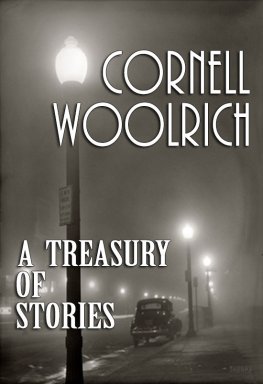


![Kornell Vulrich - Murder at Mother’s Knee [= Something That Happened in Our House]](/uploads/posts/book/882681/thumbs/kornell-vulrich-murder-at-mother-s-knee.jpg)
![Kornell Vulrich - Eyes That Watch You [= The Case of the Talking Eyes]](/uploads/posts/book/832907/thumbs/kornell-vulrich-eyes-that-watch-you-the-case.jpg)
